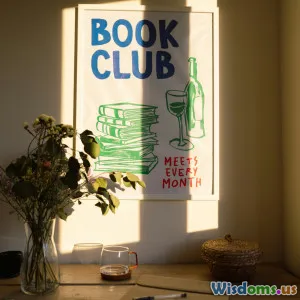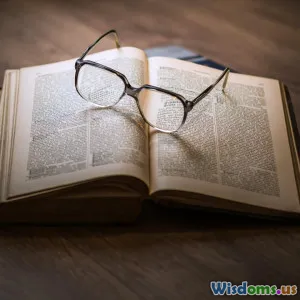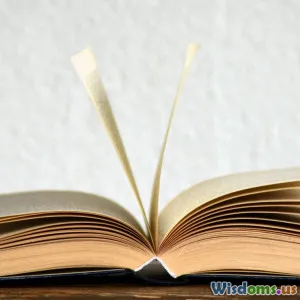
Navigating the World of Literature
5 min read Explore the vast landscape of literature, discover genres, themes, and how to approach reading and writing effectively. (0 Reviews)
Navigating the World of Literature
Literature is a vast and intricate landscape, filled with diverse genres, timeless themes, and unique narratives that reflect the human experience. Whether you're an avid reader, a budding writer, or simply a curious mind, navigating this world can be both exciting and overwhelming. In this article, we will explore the various genres, key themes, and practical approaches to enhance your reading and writing experiences.
The Landscape of Genres
Fiction vs. Non-Fiction
At the heart of literature is the distinction between fiction and non-fiction. Fiction encompasses any narrative that is created from the imagination, including novels, short stories, and plays. Non-fiction, on the other hand, is grounded in reality and includes biographies, essays, and historical accounts.
Sub-genres
Within these categories lie countless sub-genres that cater to different tastes:
- Fantasy: Encompasses magical elements, otherworldly settings, and mythical creatures (e.g., J.R.R. Tolkien’s The Lord of the Rings).
- Science Fiction: Explores futuristic concepts, advanced technology, and space exploration (e.g., Isaac Asimov’s Foundation series).
- Mystery: Centers around solving a crime or unraveling a puzzle (e.g., Agatha Christie’s Murder on the Orient Express).
- Historical Fiction: Blends fictional characters with real historical events (e.g., Ken Follett’s The Pillars of the Earth).
- Memoir: A personal account that reflects significant life events (e.g., Michelle Obama’s Becoming).
Understanding these genres can help you select the type of literature that resonates with you, enhancing your reading experience.
Themes: The Heart of Literature
Themes serve as the underlying messages or central ideas that drive a narrative. They reflect societal issues, personal conflicts, and universal truths. Here are some prevalent themes:
- Love and Relationships: Explores romantic, familial, and platonic connections.
- Identity and Self-Discovery: Focuses on the journey of finding oneself (e.g., The Catcher in the Rye by J.D. Salinger).
- Conflict and Resolution: Highlights struggles, whether internal or external, and the pursuit of peace.
- Cultural and Social Issues: Addresses themes like race, gender, and class (e.g., To Kill a Mockingbird by Harper Lee).
- Mortality and Existence: Questions of life, death, and what comes after (e.g., The Road by Cormac McCarthy).
By recognizing these themes, readers can connect more deeply with the text and engage in critical discussions about the material.
Practical Approaches to Reading
Active Reading Techniques
To truly immerse yourself in literature, consider adopting active reading techniques:
- Annotate: Take notes in the margins, underline important passages, or use sticky notes to jot down thoughts.
- Reflect: Pause periodically to reflect on what you've read and how it relates to your life or current events.
- Discuss: Joining a book club or discussing literature with friends can enhance your understanding and appreciation of the text.
Setting Reading Goals
Set achievable goals such as reading a certain number of books per month or exploring a new genre. This can motivate you to diversify your reading list and expand your horizons.
Tips for Aspiring Writers
Writing is an integral part of the literary world, and developing your craft takes practice and perseverance:
- Read Widely: Exposure to various genres and styles will inform your writing.
- Write Regularly: Establish a writing routine that suits your lifestyle to build discipline.
- Seek Feedback: Share your work with peers or writing groups to gain constructive criticism.
- Revise: Embrace the editing process; great writers know that first drafts are seldom perfect.
Conclusion
Navigating the world of literature involves understanding its genres, exploring its themes, and developing practical reading and writing skills. By actively engaging with texts and embracing both reading and writing, you can enrich your literary journey. Whether you find solace in fiction or enlightenment in non-fiction, the world of literature awaits your exploration. So, grab a book, start a writing project, and let the stories unfold!
Rate the Post
User Reviews
Popular Posts





















